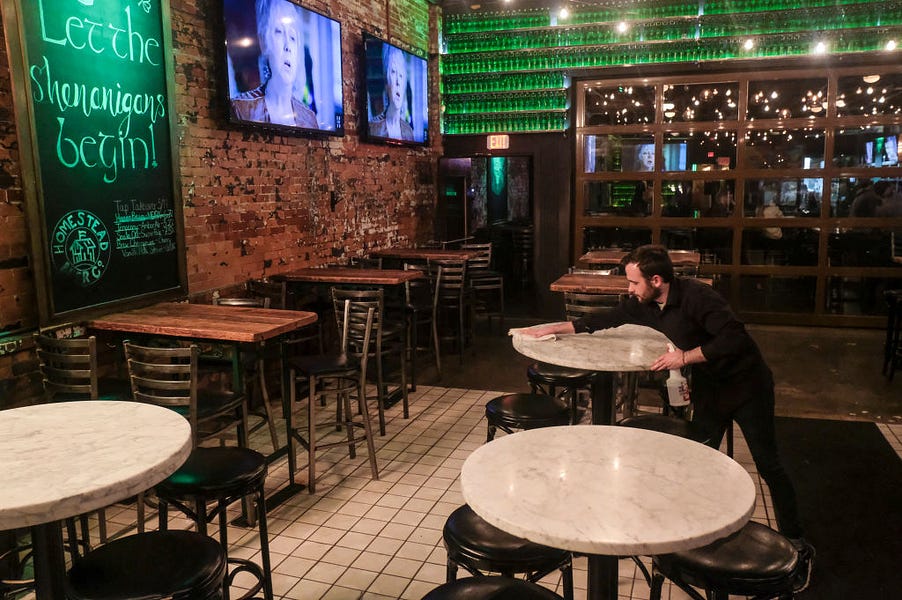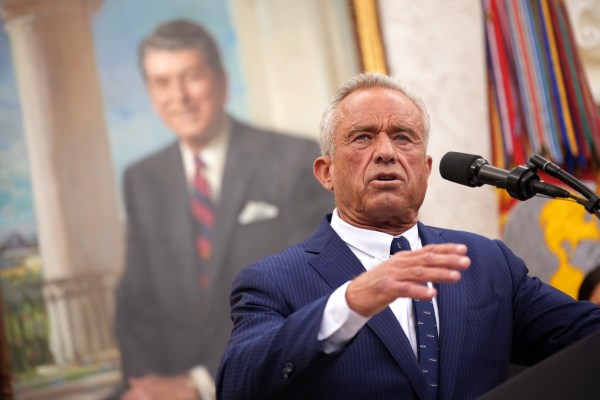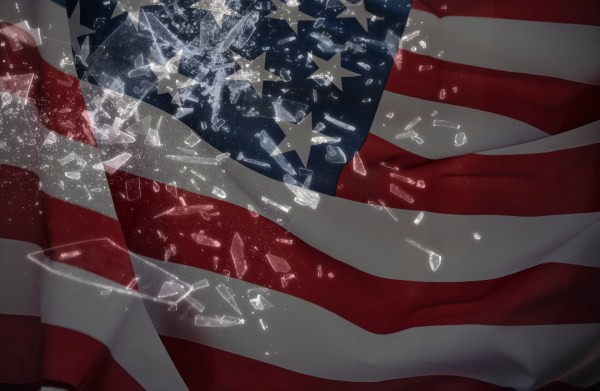From the very first moment that governors and other public officials began ordering bars and restaurants to close and imposed limits on public gatherings, I’ve been deluged with legal questions: Can states really order businesses to close and limit public meetings? Why are the orders typically coming from governors? Are the state closure orders evidence the president is failing? If the government orders a business to close for a public purpose, isn’t it required to compensate the business owner?
Here are the short answers. Yes, states have the power to order closures in the face of a known, deadly pandemic. The closures are coming from governors because the governors have the relevant legal authority. No, state closings are not evidence the president is failing, they represent federalism at work. And finally, closed businesses are likely not due any compensation (though the government can choose to provide relief)—at least so long as the closures don’t last long.
Now, let’s explain. This won’t be a law review article, so I’ll be writing in broad strokes. The underlying statutory structure is complex and varied at the federal, state, and local levels, but the relevant constitutional principles are relatively simple, they make sense, and they’ve been understood and applied since the nation’s founding to safeguard public health.
It’s vitally important to understand that while the federal government possesses far more resources than any state, the president has less inherent authority to respond to pandemics than governors. The federal government is a government of enumerated powers—it has only the powers granted it by the Constitution. Therefore, for the president or Congress to act they have to locate the source of their authority within a specific provision of the Constitution.
The states, by contrast, possess a general police power—an inherent authority that is then limited by both the state and federal Constitution. A governor or state legislature can often act without a specific grant of power. The power to act is presumed, absent a specific limitation.
In 1824, the Supreme Court observed in Gibbons v. Ogden that sovereign state authority includes the authority to enact “quarantine laws” and “health laws of every description.” Think of it like this: Just as the president and the federal government act at the peak of their powers when national security is threatened, America’s governors are often at the peak of their power when public health is at stake.
Thus, as AEI’s Jay Cost noted in an excellent Twitter thread on police power vs. enumerated power, a governor backed by a state legislature has “the sovereign power to make you go home if you are a menace to ‘public health.’” President Trump, he notes, does not have that power. Thus, governors have broad latitude to order curfews, close businesses, and limit public gatherings.
But what about the First Amendment? Can the government really order churches to close? Doesn’t the First Amendment guarantee free exercise of religion? What about a citizen’s rights of freedom of assembly and freedom of association?
If a state closure order targeted churches—and churches only—the order would almost certainly be unconstitutional. But the state closures orders in response to COVID-19 represent classic examples of a “neutral law of general applicability” that are presumptively lawful under Employment Division v. Smith. If restaurants and bars and movie theaters are closed at the same time, churches won’t enjoy any special protection under the Free Exercise Clause.
Setting aside churches for the moment, the state interest in confronting a recognized, deadly pandemic that is breaking out on American shores is so strong that most bans on public gatherings will pass even the most exacting legal scrutiny. Even laws that directly curtail First Amendment freedoms will be upheld if they can pass a legal test called “strict scrutiny,” which requires the government to demonstrate that its actions advance a compelling governmental interest and are enacted through the least restrictive legal means.
At present, that test would be easy to pass. There is unquestionably a compelling governmental interest in protecting the public from COVID-19, a communicable disease far deadlier than the flu. Because it is so easily transmitted through person-to-person contact, it’s easy to argue that even broad bans on public gatherings are among the least restrictive means of advancing the government’s interest.
Under normal circumstances a governor cannot simply invoke public health and sweep aside the First Amendment. There has to be a real evidentiary basis for his or her assertions of an overriding public need, and bans that were lawful when implemented may become unlawful if they linger too long. But for now, bans on public gatherings—especially in states and cities where COVID-19 has been detected—are virtually certain to pass constitutional muster.
The police power extends also to quarantines, and here—through interesting quirks in constitutional law—the government’s authority may be nearly impossible to challenge. If you’re home from work and have time, I’d urge you to read a fascinating law review article by law professor Wendy Parmet that explores why it’s so difficult to “quarantine” the law of quarantines.
A true quarantine—though permitted by the state’s police power, by a labyrinth of state statutes, and by applicable federal statutes in limited circumstances—is a deprivation of liberty and thus can’t be accomplished without providing due process. Yet quarantines tend to be relatively short, and it’s virtually impossible to complete a legal challenge before the quarantine period expires. Moreover, because public officials will almost always enjoy qualified immunity when making quarantine decisions, even a wrongly-quarantined individual will likely not be able to recover damages for the violation of their civil liberties.
Thus, in theory a quarantined individual will enjoy a right to challenge their confinement, but in practice that right will rarely be vindicated.
It’s also almost certainly the case that for now governments can order businesses to close without compensating the owners under the Fifth Amendment’s Takings Clause.
In Lucas v. South Carolina Coastal Council, the Supreme Court held that regulations that deprived the landowner of all “economically viable use of his land” constituted a taking that required compensation. But in Tahoe-Sierra Preservation Council, Inc. v. Tahoe Regional Planning Agency the court refused to order compensation for a landowner who faced a 32-month development moratorium. “Logically,” it said, the land “cannot be rendered valueless by a temporary prohibition on economic use, because the property will recover value as soon as the prohibition is lifted.”
Yet Tahoe-Sierra should not be read as an absolute prohibition against compensation for temporary regulatory takings. The majority indicated that it did not intend to impose an absolute rule, the composition of the court has changed substantially since 2002, and the Rehnquist/Scalia/Thomas dissents could easily become the foundation of a new majority opinion.
In fact, the outcome of any quest for compensation would likely track the prospects of a First Amendment claim. Temporary measures taken now, at the onset of the crisis, are likely to receive a great deal of judicial deference. That deference is likely to decline if draconian measures remain in place even as the crisis eases.
Finally, let’s briefly deal with a concern that I see floating across the internet—that the president can or will simply declare an emergency, sweep aside existing constitutional and statutory constraints on his power, and rule America with an iron fist. Declaring an emergency—even a public health emergency—doesn’t unlock a secret back door out of the Constitution. Rather, it mainly unlocks specific additional statutory powers, and those powers—such as making grants, waiving various regulations, and activating military medical resources—typically fall well short of the kind of general police power that American governors enjoy. The true extent of federal authority to respond to pandemics is a topic for a different piece, and declaring a public health emergency can free up immense federal resources to combat an outbreak, but the constitutional order remains in place—including the availability of judicial review for alleged violations of civil liberties.
As Americans hunker down and attempt to “flatten the curve” to contain the spread of COVID-19, the police power of the states is the government authority most likely to immediately impact your life, and that police power—for now—is at or near its apex. All eyes may turn to Trump, but it’s your statehouse that’s the first line of local defense—and that’s exactly how the nation was designed.
Photograph of a waiter cleaning up a bar in the Short North District in Columbus, Ohio, by Matthew Hatcher/Getty Images.







Please note that we at The Dispatch hold ourselves, our work, and our commenters to a higher standard than other places on the internet. We welcome comments that foster genuine debate or discussion—including comments critical of us or our work—but responses that include ad hominem attacks on fellow Dispatch members or are intended to stoke fear and anger may be moderated.
With your membership, you only have the ability to comment on The Morning Dispatch articles. Consider upgrading to join the conversation everywhere.